AB LABEL
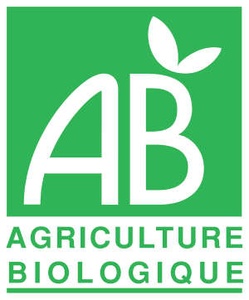
AB agriculture biologique:
- Composed of at least 95% organically produced ingredients
- Absence of GMOs within the limit of 0.9%.
- Composed of at least 95% organically produced ingredients
- Absence of GMOs within the limit of 0.9%.
The Agriculture Biologique label (or AB label) is a French quality label created in 1985, based on the prohibition of the use of products derived from synthetic chemistry. It is used to identify products from organic farming.
Property of the French Ministry of Agriculture, the AB label is defined by it and promoted by the Agence bio.
Since 1 January 2009, its criteria have been aligned with the European organic label, which is less restrictive than the initial AB label and notably authorises the presence of accidental traces of GMOs. The European organic label is intended to gradually replace the AB label.
Several certification bodies are authorised to issue this certification: Agrocert, Bureau Veritas Certification, Certipaq, Ecocert SA, Bureau Alpes Contrôles, Qualité France, Certisud, and Qualisud.
According to the Agence Bio, this label guarantees:
- that the food is composed of at least 95% of ingredients from an organic production method;
- the absence of GMOs, although minute traces may be present, accidentally or unavoidably, within the limit of 0.9%;
- certification under the supervision of a body approved by the French public authorities and meeting the criteria of independence, impartiality, competence and efficiency defined by the European standard EN 45011;
- compliance with the regulations in force in France.
Property of the French Ministry of Agriculture, the AB label is defined by it and promoted by the Agence bio.
Since 1 January 2009, its criteria have been aligned with the European organic label, which is less restrictive than the initial AB label and notably authorises the presence of accidental traces of GMOs. The European organic label is intended to gradually replace the AB label.
Several certification bodies are authorised to issue this certification: Agrocert, Bureau Veritas Certification, Certipaq, Ecocert SA, Bureau Alpes Contrôles, Qualité France, Certisud, and Qualisud.
According to the Agence Bio, this label guarantees:
- that the food is composed of at least 95% of ingredients from an organic production method;
- the absence of GMOs, although minute traces may be present, accidentally or unavoidably, within the limit of 0.9%;
- certification under the supervision of a body approved by the French public authorities and meeting the criteria of independence, impartiality, competence and efficiency defined by the European standard EN 45011;
- compliance with the regulations in force in France.
Certified B corporation
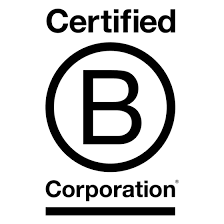
Best for the world certification: The aim is to engage the private sector on the path to sustainability and to act in the public interest. It is awarded to commercial (for-profit) companies that meet societal and environmental, governance and public transparency requirements. It is reviewed by a multi-stakeholder committee every 18 months and covers an entire company, all its departments and all its business sectors.
The "B Corp" certification (also known as "B Lab" or "B Corporation" certification) is a certification granted to commercial (for-profit) companies that meet societal and environmental, governance and public transparency requirements.
This certification is awarded by B Lab, a non-profit organisation established in the United States, Europe, South America, Canada, Australia and New Zealand. To be awarded the certification and then maintain it, a company must achieve a minimum score of 80 points (out of 200) on the international standard, which is accessible in the online tool "B Impact Assessment". Once the social and environmental impact assessment has been carried out, it is submitted to B Lab for verification. In addition to the verification, the company can modify its legal statuses. This step involves requesting a general meeting and therefore having the shareholders and directors validate the adapted goals as well as the new articles of association which add admissibility towards the rest of the company, its stakeholders and the environment. Certification fees vary according to the turnover of the companies, with annual fees ranging from $500 to $50,000.
In March 2017, the "B Corp" movement had 2,064 certified companies from 131 industry sectors in 51 countries.
The "B Corp" certification is based on an independent international standard, which is reviewed by a multi-stakeholder committee, the Standards Advisory Council, every 18 months. Companies wishing to comply with it must meet societal and environmental, governance and public transparency requirements. Their results are posted publicly, indicating their performance on specific issues. The certification covers an entire company, all its departments and all sectors of activity. Certification is limited to for-profit entities, regardless of their legal form. The aim is to engage the private sector on the path to sustainability and to act in the public interest.
This certification is awarded by B Lab, a non-profit organisation established in the United States, Europe, South America, Canada, Australia and New Zealand. To be awarded the certification and then maintain it, a company must achieve a minimum score of 80 points (out of 200) on the international standard, which is accessible in the online tool "B Impact Assessment". Once the social and environmental impact assessment has been carried out, it is submitted to B Lab for verification. In addition to the verification, the company can modify its legal statuses. This step involves requesting a general meeting and therefore having the shareholders and directors validate the adapted goals as well as the new articles of association which add admissibility towards the rest of the company, its stakeholders and the environment. Certification fees vary according to the turnover of the companies, with annual fees ranging from $500 to $50,000.
In March 2017, the "B Corp" movement had 2,064 certified companies from 131 industry sectors in 51 countries.
The "B Corp" certification is based on an independent international standard, which is reviewed by a multi-stakeholder committee, the Standards Advisory Council, every 18 months. Companies wishing to comply with it must meet societal and environmental, governance and public transparency requirements. Their results are posted publicly, indicating their performance on specific issues. The certification covers an entire company, all its departments and all sectors of activity. Certification is limited to for-profit entities, regardless of their legal form. The aim is to engage the private sector on the path to sustainability and to act in the public interest.
Certisys

Certifies that organic products comply with EU organic farming regulations.
Born from a group of pioneers with a passion for the land, engineers and agronomists convinced of the need to protect the soil and its exploitation, CERTISYS was created in 1991 in order to take up the challenge of a reliable and credible control and certification of organic farming. The control system of this sector is one of the foundations that allows it to develop in a healthy way, guaranteeing the authenticity of organic farming and avoiding fraud.
Active for more than 25 years, they work locally in Belgium, Luxembourg and Africa - and also in a worldwide network - in partnership with a growing number of farmers and food companies, but also in other areas committed to sustainable development such as fair trade.
Based on values of proximity, ethics, independence, transparency and impartiality, CERTISYS works for the development of sustainable agriculture and food, taking care to respect people, animals and the planet.
CERTISYS:
- collaborates with all members of the organic sector: operators (producers, processors, distributors, restaurateurs, retailers and importers), consumers, and public authorities, to develop and promote organic farming in a participatory way.
- demonstrates that a product (or products), as well as the corresponding production techniques, comply with the Agriculture Biologique regulations specific to that product (or those products).
The control report only takes into account the observations made during the audit and does not prejudge any additional remarks that may be made during subsequent audits. In case of non-conformity, requests for improvement or sanctions can be addressed by CERTISYS to the operator concerned who, in certain cases, will no longer be able to refer to organic farming for the products concerned.
The certificate issued is linked to products or groups of products. It indicates the products that conform to the organic production method according to different categories:
- from organic farming;
- processed products: 95% of ingredients of organic farming origin (tolerance for 5% non-organic ingredients included in a restrictive list - Annex IX of 889/2008);
- processed products: 95% of ingredients of organic farming origin (only reference to organic farming in the list of ingredients);
- main product of hunting or fishing with other ingredients of organic agricultural origin. The certificate authorises the right to mention on the labelling of the conforming product the indications referring to the organic production method according to these different categories. It is issued after inspection and certification and has a well-defined period of validity.
During the audit, the auditors draw up a report on the measures taken to comply with the organic production rules. There are several types of controls:
- An annual control: The project must be inspected at least once a year.
- An additional control: it can take place in case the project undergoes important changes during the year or they need to have additional essential information at their disposal.
- Unannounced controls: may be carried out based on a risk analysis.
The controls, carried out by the CERTISYS auditor, consist among others of checking:
- the conformity of the project description with the visit of the different production sites, both from the point of view of the cultivated areas, the origin of the plant material and inputs, the technical itinerary, the administrative records and the traceability of the harvests.
- the origin of the basic raw materials,
- the collection system and storage facilities,
- the separation measures between conventional and organic products,
- the recipes and preparation procedures,
- the packaging materials and labelling,
Samples can be taken at any point in the process (from the soil to the finished product and all the intermediate stages). Analyses will be carried out by an accredited laboratory.
https://www.certisys.eu/
Active for more than 25 years, they work locally in Belgium, Luxembourg and Africa - and also in a worldwide network - in partnership with a growing number of farmers and food companies, but also in other areas committed to sustainable development such as fair trade.
Based on values of proximity, ethics, independence, transparency and impartiality, CERTISYS works for the development of sustainable agriculture and food, taking care to respect people, animals and the planet.
CERTISYS:
- collaborates with all members of the organic sector: operators (producers, processors, distributors, restaurateurs, retailers and importers), consumers, and public authorities, to develop and promote organic farming in a participatory way.
- demonstrates that a product (or products), as well as the corresponding production techniques, comply with the Agriculture Biologique regulations specific to that product (or those products).
The control report only takes into account the observations made during the audit and does not prejudge any additional remarks that may be made during subsequent audits. In case of non-conformity, requests for improvement or sanctions can be addressed by CERTISYS to the operator concerned who, in certain cases, will no longer be able to refer to organic farming for the products concerned.
The certificate issued is linked to products or groups of products. It indicates the products that conform to the organic production method according to different categories:
- from organic farming;
- processed products: 95% of ingredients of organic farming origin (tolerance for 5% non-organic ingredients included in a restrictive list - Annex IX of 889/2008);
- processed products: 95% of ingredients of organic farming origin (only reference to organic farming in the list of ingredients);
- main product of hunting or fishing with other ingredients of organic agricultural origin. The certificate authorises the right to mention on the labelling of the conforming product the indications referring to the organic production method according to these different categories. It is issued after inspection and certification and has a well-defined period of validity.
During the audit, the auditors draw up a report on the measures taken to comply with the organic production rules. There are several types of controls:
- An annual control: The project must be inspected at least once a year.
- An additional control: it can take place in case the project undergoes important changes during the year or they need to have additional essential information at their disposal.
- Unannounced controls: may be carried out based on a risk analysis.
The controls, carried out by the CERTISYS auditor, consist among others of checking:
- the conformity of the project description with the visit of the different production sites, both from the point of view of the cultivated areas, the origin of the plant material and inputs, the technical itinerary, the administrative records and the traceability of the harvests.
- the origin of the basic raw materials,
- the collection system and storage facilities,
- the separation measures between conventional and organic products,
- the recipes and preparation procedures,
- the packaging materials and labelling,
Samples can be taken at any point in the process (from the soil to the finished product and all the intermediate stages). Analyses will be carried out by an accredited laboratory.
https://www.certisys.eu/
Cosmebio Cosmétique Bio
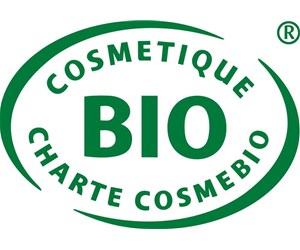
Minimum 95% of ingredients of natural origin.
Mandatory control by an independent certifier every year to check the conformity of the products with all the criteria of the label.
Mandatory control by an independent certifier every year to check the conformity of the products with all the criteria of the label.
The Cosmebio Association is based on 3 unifying themes:
- People, ethics and social responsibility
- A scientific approach for an ecological and organic cosmetic that is supervised and controlled
- Respect for nature and support for organic farming
And is based on 8 commitments that support the founding themes of the Association:
- 3 commitments are line guides: responsible communication, fair trade and biodiversity assessments.
- 4 commitments represent obligations: training, clear consumer information, the share of labelled products and respect for the Cosmebio graphic charter.
- 1 commitment is made collectively: the Annual Sustainable Development Report of the Cosmebio Association.
Commitment n°1: to participate in Cosmebio training days. Any company joining the Association undertakes to involve one or more referents of its choice in one training day per year on the guiding principles of the Cosmebio Association, its reference system and its developments. This training is provided by the Cosmebio Association.
Commitment n°2: to draw up an evaluation on Fair Trade practices. All members undertake to carry out and/or to have carried out with their suppliers concerned an Evaluation on their Fair Trade practices which integrates the fundamentals of Fair Trade within one year from the date of their membership. An evaluation grid is proposed by the Cosmebio Association. It is self-administered and must be returned to the Cosmebio Association which will be able to integrate this information anonymously and statistically in its Annual Sustainable Development Report.
Commitment n°3: to label all or part of the products of a brand. Any commercial brand which contains the word "organic" in its name and which holds or will hold at least one certified and labelled Cosmebio product must label Cosmebio 100% of the products of the commercial brand concerned. Any member company whose commercial brand holds a product under the Cosmebio label must label Cosmebio at least 20% of the products of the commercial brand concerned within 3 years' time.
Commitment n°4: to clearly inform consumers. For any product with the Cosmebio label, the member company must, within 6 months of the certificate of conformity to the standard, communicate on the Cosmebio Association website the list of ingredients of the product concerned according to the International Nomenclature of Cosmetic Ingredients (INCI).
Commitment n°5: to contribute to the evaluation of biodiversity. Each applicant undertakes to carry out and submit to the Association an evaluation of the biodiversity of its Cosmebio-labelled products within one year from the date of its membership. An evaluation grid is proposed by the Cosmebio Association. It is self-administered and must be returned to the Cosmebio Association, which will integrate this information anonymously and statistically in its Annual Sustainable Development Report.
Commitment n°6: to adopt responsible communication. All members undertake to follow the recommendations of the Cosmebio communication charter for all communication referring to products bearing the Cosmebio label. This communication charter is based on a self-diagnosis grid, developed from reference texts published by the advertising regulatory authorities and also from best practices in France, Europe and abroad concerning the communication of products and services claiming to be part of a sustainable development approach.
Commitment n°7: to respect the standard for the use of the Cosmebio logo. All candidates undertake to strictly respect the graphic charter which prescribes the conformity of the use of the Cosmebio logo on all communication media: packaging, advertising, etc. The Cosmebio graphic charter is given to each member at the time of registration with the Association.
Commitment n°8: to publish an Annual Sustainable Development Report. To confirm the commitment of its association and to assume its responsibility within the sector and towards society, the Cosmebio Association undertakes to publish a Sustainable Development Report every year which will indicate the current state of play, the objectives and the progress made by its members on its founding themes and on their key indicators.
https://www.cosmebio.org/fr/
- People, ethics and social responsibility
- A scientific approach for an ecological and organic cosmetic that is supervised and controlled
- Respect for nature and support for organic farming
And is based on 8 commitments that support the founding themes of the Association:
- 3 commitments are line guides: responsible communication, fair trade and biodiversity assessments.
- 4 commitments represent obligations: training, clear consumer information, the share of labelled products and respect for the Cosmebio graphic charter.
- 1 commitment is made collectively: the Annual Sustainable Development Report of the Cosmebio Association.
Commitment n°1: to participate in Cosmebio training days. Any company joining the Association undertakes to involve one or more referents of its choice in one training day per year on the guiding principles of the Cosmebio Association, its reference system and its developments. This training is provided by the Cosmebio Association.
Commitment n°2: to draw up an evaluation on Fair Trade practices. All members undertake to carry out and/or to have carried out with their suppliers concerned an Evaluation on their Fair Trade practices which integrates the fundamentals of Fair Trade within one year from the date of their membership. An evaluation grid is proposed by the Cosmebio Association. It is self-administered and must be returned to the Cosmebio Association which will be able to integrate this information anonymously and statistically in its Annual Sustainable Development Report.
Commitment n°3: to label all or part of the products of a brand. Any commercial brand which contains the word "organic" in its name and which holds or will hold at least one certified and labelled Cosmebio product must label Cosmebio 100% of the products of the commercial brand concerned. Any member company whose commercial brand holds a product under the Cosmebio label must label Cosmebio at least 20% of the products of the commercial brand concerned within 3 years' time.
Commitment n°4: to clearly inform consumers. For any product with the Cosmebio label, the member company must, within 6 months of the certificate of conformity to the standard, communicate on the Cosmebio Association website the list of ingredients of the product concerned according to the International Nomenclature of Cosmetic Ingredients (INCI).
Commitment n°5: to contribute to the evaluation of biodiversity. Each applicant undertakes to carry out and submit to the Association an evaluation of the biodiversity of its Cosmebio-labelled products within one year from the date of its membership. An evaluation grid is proposed by the Cosmebio Association. It is self-administered and must be returned to the Cosmebio Association, which will integrate this information anonymously and statistically in its Annual Sustainable Development Report.
Commitment n°6: to adopt responsible communication. All members undertake to follow the recommendations of the Cosmebio communication charter for all communication referring to products bearing the Cosmebio label. This communication charter is based on a self-diagnosis grid, developed from reference texts published by the advertising regulatory authorities and also from best practices in France, Europe and abroad concerning the communication of products and services claiming to be part of a sustainable development approach.
Commitment n°7: to respect the standard for the use of the Cosmebio logo. All candidates undertake to strictly respect the graphic charter which prescribes the conformity of the use of the Cosmebio logo on all communication media: packaging, advertising, etc. The Cosmebio graphic charter is given to each member at the time of registration with the Association.
Commitment n°8: to publish an Annual Sustainable Development Report. To confirm the commitment of its association and to assume its responsibility within the sector and towards society, the Cosmebio Association undertakes to publish a Sustainable Development Report every year which will indicate the current state of play, the objectives and the progress made by its members on its founding themes and on their key indicators.
https://www.cosmebio.org/fr/
Cosmos Natural

The label guarantees an eco-friendly production method WITHOUT any requirements concerning a minimum percentage of ingredients of organic origin.
The Cosmos Natural label guarantees an eco-friendly production method.
This label is an international standard created in 2002 for cosmetics and is managed by Cosmos Standard.
It is based on five existing European eco-labels for cosmetics:
BDIH (Germany), Cosmebio (France), Ecocert Greenlife SAS (France), ICEA (Italy) and Soil Association (Great Britain).
Cosmos Standard calls for a harmonisation of all labels concerning eco-friendly cosmetics.
The Cosmos Natural label does not have a requirement for a minimum percentage of ingredients of organic origin.
It applies to products that comply with the following standards (categories of ingredients and applicable requirements):
- Physically processed agricultural ingredients - may be of plant, animal or microbial origin, but no GMOs, no critically endangered species, but only animal products (not being an integral part);
- Chemically processed agricultural ingredients - as above, and the chemical treatments must respect the principles of green chemistry, with the resulting ingredients respecting strict limitations of toxicity and biodegradability;
- Water - must comply with hygiene standards;
- Minerals and ingredients of mineral origin - must be of natural origin and can be modified by simple chemical reactions;
- Other ingredients - a very limited list of preservatives, as well as some other petrochemical ingredients and components are temporarily allowed and reviewed regularly, based on acceptable alternatives.
- Companies must also ensure that their packaging is minimised and eco-friendly. They must also have an environmental and waste management plan for their plants.
- Finally, all products manufactured according to these standards must be certified by an independently accredited certification body. This ensures that the certification body is competent and professional. They will check everything necessary on the product to ensure that it complies with the standard and that it is labelled accurately and clearly.
http://www.cosmos-standard.org
This label is an international standard created in 2002 for cosmetics and is managed by Cosmos Standard.
It is based on five existing European eco-labels for cosmetics:
BDIH (Germany), Cosmebio (France), Ecocert Greenlife SAS (France), ICEA (Italy) and Soil Association (Great Britain).
Cosmos Standard calls for a harmonisation of all labels concerning eco-friendly cosmetics.
The Cosmos Natural label does not have a requirement for a minimum percentage of ingredients of organic origin.
It applies to products that comply with the following standards (categories of ingredients and applicable requirements):
- Physically processed agricultural ingredients - may be of plant, animal or microbial origin, but no GMOs, no critically endangered species, but only animal products (not being an integral part);
- Chemically processed agricultural ingredients - as above, and the chemical treatments must respect the principles of green chemistry, with the resulting ingredients respecting strict limitations of toxicity and biodegradability;
- Water - must comply with hygiene standards;
- Minerals and ingredients of mineral origin - must be of natural origin and can be modified by simple chemical reactions;
- Other ingredients - a very limited list of preservatives, as well as some other petrochemical ingredients and components are temporarily allowed and reviewed regularly, based on acceptable alternatives.
- Companies must also ensure that their packaging is minimised and eco-friendly. They must also have an environmental and waste management plan for their plants.
- Finally, all products manufactured according to these standards must be certified by an independently accredited certification body. This ensures that the certification body is competent and professional. They will check everything necessary on the product to ensure that it complies with the standard and that it is labelled accurately and clearly.
http://www.cosmos-standard.org
Cosmos Organic

The label guarantees an eco-friendly production method WITH requirements concerning a minimum percentage of ingredients of organic origin.
The Cosmos Organic label guarantees an eco-friendly production method containing a required percentage of organically grown ingredients.
You will find the percentage of organic ingredients in the product on the label.
This label is an international standard created in 2002 for cosmetics and is managed by Cosmos Standard.
It is based on five existing European eco-labels for cosmetics:
BDIH (Germany), Cosmebio (France), Ecocert Greenlife SAS (France), ICEA (Italy) and Soil Association (Great Britain).
Cosmos Standard calls for a harmonisation of all labels concerning eco-friendly cosmetics. It applies to products that comply with the following standards (categories of ingredients and applicable requirements):
- Physically processed agricultural ingredients - may be of plant, animal or microbial origin, but no GMOs, no critically endangered species, but only animal products (not being an integral part);
- Chemically processed agricultural ingredients - as above, and the chemical treatments must respect the principles of green chemistry, with the resulting ingredients respecting strict limitations of toxicity and biodegradability;
- Water - must comply with hygiene standards;
- Minerals and ingredients of mineral origin - must be of natural origin and can be modified by simple chemical reactions;
- Other ingredients - a very limited list of preservatives, as well as some other petrochemical ingredients and components are temporarily allowed and reviewed regularly, based on acceptable alternatives.
- Companies must also ensure that their packaging is minimised and eco-friendly. They must also have an environmental and waste management plan for their plants.
Finally, all products manufactured according to these standards must be certified by an independently accredited certification body. This ensures that the certification body is competent and professional. They will check everything necessary on the product to ensure that it complies with the standard and that it is labelled accurately and clearly.
http://www.cosmos-standard.org
You will find the percentage of organic ingredients in the product on the label.
This label is an international standard created in 2002 for cosmetics and is managed by Cosmos Standard.
It is based on five existing European eco-labels for cosmetics:
BDIH (Germany), Cosmebio (France), Ecocert Greenlife SAS (France), ICEA (Italy) and Soil Association (Great Britain).
Cosmos Standard calls for a harmonisation of all labels concerning eco-friendly cosmetics. It applies to products that comply with the following standards (categories of ingredients and applicable requirements):
- Physically processed agricultural ingredients - may be of plant, animal or microbial origin, but no GMOs, no critically endangered species, but only animal products (not being an integral part);
- Chemically processed agricultural ingredients - as above, and the chemical treatments must respect the principles of green chemistry, with the resulting ingredients respecting strict limitations of toxicity and biodegradability;
- Water - must comply with hygiene standards;
- Minerals and ingredients of mineral origin - must be of natural origin and can be modified by simple chemical reactions;
- Other ingredients - a very limited list of preservatives, as well as some other petrochemical ingredients and components are temporarily allowed and reviewed regularly, based on acceptable alternatives.
- Companies must also ensure that their packaging is minimised and eco-friendly. They must also have an environmental and waste management plan for their plants.
Finally, all products manufactured according to these standards must be certified by an independently accredited certification body. This ensures that the certification body is competent and professional. They will check everything necessary on the product to ensure that it complies with the standard and that it is labelled accurately and clearly.
http://www.cosmos-standard.org
Cruelty Free international
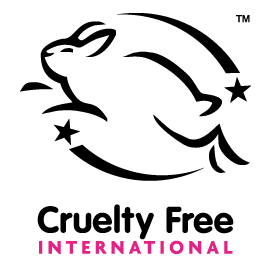
The "leaping bunny" label certifies that the product has not been tested on live animals.
Cruelty Free International's Leaping Bunny is an internationally renowned certification for cosmetics, skin care and household brands not tested on animals.
Cruelty Free International's areas of work include lobbying governments, investigations, media activities and the promotion of humane products.
In order to obtain the Leaping Bunny label, companies are subject to an independent audit of their entire supply chain monitoring system to ensure that they meet Cruelty Free International's strict criteria.
http://www.crueltyfreeinternational.org/
Cruelty Free International's areas of work include lobbying governments, investigations, media activities and the promotion of humane products.
In order to obtain the Leaping Bunny label, companies are subject to an independent audit of their entire supply chain monitoring system to ensure that they meet Cruelty Free International's strict criteria.
http://www.crueltyfreeinternational.org/
d2W

d2W®, included in the manufacturing process, converts everyday plastic products (based on PE or PP) into biodegradable materials.
The plastic additive d2w® OXO-biodegradable (lifetime controlled) is the only product of its kind to have received an internationally renowned ecolabel.
d2W®, included during the manufacturing process, converts everyday plastic products (based on PE or PP) into degradable materials. The plastic biodegrades in the environment in the same way as a sheet and leaves nothing behind - no toxic residues or plastic fragments.
Microplastics are created when ordinary plastics fragment under the influence of sunlight, but OXO plastic turns into biodegradable materials and degrades in nature much faster than ordinary plastic.
https://www.symphonyenvironmental.com/
d2W®, included during the manufacturing process, converts everyday plastic products (based on PE or PP) into degradable materials. The plastic biodegrades in the environment in the same way as a sheet and leaves nothing behind - no toxic residues or plastic fragments.
Microplastics are created when ordinary plastics fragment under the influence of sunlight, but OXO plastic turns into biodegradable materials and degrades in nature much faster than ordinary plastic.
https://www.symphonyenvironmental.com/
EcoCert Cosmétique Bio

- At least 95% of the total ingredients must be natural or of natural origin.
- At least 95% of the plant ingredients in the formula must come from organic farming.
- At least 10% of the total ingredients must be organically grown.
- At least 95% of the plant ingredients in the formula must come from organic farming.
- At least 10% of the total ingredients must be organically grown.
ECOCERT is the very first certification body to develop a standard for "Ecological and Organic Cosmetics".
Submitted in 2003, the specifications were drawn up in consultation with all the stakeholders in the sector: experts, suppliers, manufacturers, distributors, consumers and development organisations.
The fundamental principles of the ECOCERT standard
In order to guarantee a cosmetic product that respects the environment, the ECOCERT standard imposes :
1. The use of ingredients derived from renewable resources and transformed by environmentally friendly processes.
ECOCERT therefore verifies :
- The absence of GMOs, parabens, phenoxyethanol, nanoparticles, silicone, PEG, synthetic perfumes and colouring agents, ingredients from animals (except those produced naturally by them: milk, honey, etc.).
- The biodegradable or recyclable nature of the packaging.
2. A minimum threshold of natural and organically grown ingredients to be reached to obtain certification :
In all cases, a minimum of 95% of the total ingredients must be natural or of natural origin.
For the Organic Cosmetics label :
- A minimum of 95% of the plant-based ingredients in the formula must come from organic farming.
- At least 10% of the total ingredients must be organically grown.
/!\ : Some ingredients very present in cosmetics (water, salts, minerals) cannot be certified organic because they do not come from agriculture. Shampoos and certain creams, composed mainly of water, contain between 10% and 40% organic ingredients. An essential oil, which does not contain water, can have up to 100% organic ingredients.
3. Annual audits of all product manufacturing and packaging sites.
http://www.ecocert.com/cosmetique-ecologique-et-biologique/index.html
Submitted in 2003, the specifications were drawn up in consultation with all the stakeholders in the sector: experts, suppliers, manufacturers, distributors, consumers and development organisations.
The fundamental principles of the ECOCERT standard
In order to guarantee a cosmetic product that respects the environment, the ECOCERT standard imposes :
1. The use of ingredients derived from renewable resources and transformed by environmentally friendly processes.
ECOCERT therefore verifies :
- The absence of GMOs, parabens, phenoxyethanol, nanoparticles, silicone, PEG, synthetic perfumes and colouring agents, ingredients from animals (except those produced naturally by them: milk, honey, etc.).
- The biodegradable or recyclable nature of the packaging.
2. A minimum threshold of natural and organically grown ingredients to be reached to obtain certification :
In all cases, a minimum of 95% of the total ingredients must be natural or of natural origin.
For the Organic Cosmetics label :
- A minimum of 95% of the plant-based ingredients in the formula must come from organic farming.
- At least 10% of the total ingredients must be organically grown.
/!\ : Some ingredients very present in cosmetics (water, salts, minerals) cannot be certified organic because they do not come from agriculture. Shampoos and certain creams, composed mainly of water, contain between 10% and 40% organic ingredients. An essential oil, which does not contain water, can have up to 100% organic ingredients.
3. Annual audits of all product manufacturing and packaging sites.
http://www.ecocert.com/cosmetique-ecologique-et-biologique/index.html
EcoCert Cosmétique Eco

- At least 95% of the total ingredients must be natural or of natural origin.
- At least 50% of the plant ingredients in the formula must come from organic farming.
- At least 5% of the total ingredients must be organically grown.
- At least 50% of the plant ingredients in the formula must come from organic farming.
- At least 5% of the total ingredients must be organically grown.
ECOCERT is the very first certification body to develop a standard for "Ecological and Organic Cosmetics".
Submitted in 2003, the specifications were drawn up in consultation with all the stakeholders in the sector: experts, suppliers, manufacturers, distributors, consumers and development organisations.
The fundamental principles of the ECOCERT standard
In order to guarantee a cosmetic product that respects the environment, the ECOCERT standard imposes :
1. The use of ingredients derived from renewable resources and transformed by environmentally friendly processes.
ECOCERT therefore verifies :
- The absence of GMOs, parabens, phenoxyethanol, nanoparticles, silicone, PEG, synthetic perfumes and dyes, ingredients from animals (except those produced naturally by them: milk, honey, etc.).
- The biodegradable or recyclable nature of the packaging.
2. A minimum threshold of natural and organically grown ingredients to be reached to obtain certification :
In all cases, a minimum of 95% of the total ingredients must be natural or of natural origin.
For the Organic Cosmetics label :
- A minimum of 95% of the plant-based ingredients in the formula must come from organic farming.
- At least 10% of the total ingredients must be organically grown.
/!\: Some ingredients very present in cosmetics (water, salts, minerals) cannot be certified organic because they do not come from agriculture. Shampoos and certain creams, composed mainly of water, contain between 10% and 40% organic ingredients. An essential oil, which does not contain water, can have up to 100% organic ingredients.
3. Annual audits of all product manufacturing and packaging sites.
http://www.ecocert.com/cosmetique-ecologique-et-biologique/index.html
Submitted in 2003, the specifications were drawn up in consultation with all the stakeholders in the sector: experts, suppliers, manufacturers, distributors, consumers and development organisations.
The fundamental principles of the ECOCERT standard
In order to guarantee a cosmetic product that respects the environment, the ECOCERT standard imposes :
1. The use of ingredients derived from renewable resources and transformed by environmentally friendly processes.
ECOCERT therefore verifies :
- The absence of GMOs, parabens, phenoxyethanol, nanoparticles, silicone, PEG, synthetic perfumes and dyes, ingredients from animals (except those produced naturally by them: milk, honey, etc.).
- The biodegradable or recyclable nature of the packaging.
2. A minimum threshold of natural and organically grown ingredients to be reached to obtain certification :
In all cases, a minimum of 95% of the total ingredients must be natural or of natural origin.
For the Organic Cosmetics label :
- A minimum of 95% of the plant-based ingredients in the formula must come from organic farming.
- At least 10% of the total ingredients must be organically grown.
/!\: Some ingredients very present in cosmetics (water, salts, minerals) cannot be certified organic because they do not come from agriculture. Shampoos and certain creams, composed mainly of water, contain between 10% and 40% organic ingredients. An essential oil, which does not contain water, can have up to 100% organic ingredients.
3. Annual audits of all product manufacturing and packaging sites.
http://www.ecocert.com/cosmetique-ecologique-et-biologique/index.html
EcoCert Cosmos Natural

COSMOS NATURAL is based on the principles of the ECOCERT standard:
The label guarantees an eco-friendly production method WITHOUT any requirements concerning a minimum percentage of ingredients of organic origin.
The label guarantees an eco-friendly production method WITHOUT any requirements concerning a minimum percentage of ingredients of organic origin.
COSMOS (COSMetic Organic Standard) is a private European-wide standard that was developed by five founding members:
BDIH (Germany), Cosmebio (France), ECOCERT Greenlife SAS (France), ICEA (Italy) and Soil Association (Great Britain).
They were all brought together in the AISBL (an international association based in Brussels), with the aim of
- defining common minimum requirements,
- harmonising the rules for the certification of organic and natural cosmetics, and
- lobbying institutions in order to defend the sector.
COSMOS takes up the principles of the ECOCERT standard (January 2003 version):
- Promote the use of ingredients from organic farming
- Use production and transformation processes that respect the environment and human health
- Integrate and develop the concept of "green chemistry".
http://www.ecocert.com/cosmos/index.html
BDIH (Germany), Cosmebio (France), ECOCERT Greenlife SAS (France), ICEA (Italy) and Soil Association (Great Britain).
They were all brought together in the AISBL (an international association based in Brussels), with the aim of
- defining common minimum requirements,
- harmonising the rules for the certification of organic and natural cosmetics, and
- lobbying institutions in order to defend the sector.
COSMOS takes up the principles of the ECOCERT standard (January 2003 version):
- Promote the use of ingredients from organic farming
- Use production and transformation processes that respect the environment and human health
- Integrate and develop the concept of "green chemistry".
http://www.ecocert.com/cosmos/index.html
EcoCert Cosmos Organic

COSMOS NATURAL is based on the principles of the ECOCERT standard:
The label guarantees an eco-friendly production method WITH requirements concerning a minimum percentage of ingredients of organic origin.
The label guarantees an eco-friendly production method WITH requirements concerning a minimum percentage of ingredients of organic origin.
COSMOS (COSMetic Organic Standard) is a private European-wide standard that was developed by five founding members:
BDIH (Germany), Cosmebio (France), ECOCERT Greenlife SAS (France), ICEA (Italy) and Soil Association (Great Britain).
They were all brought together in the AISBL (an international association based in Brussels), with the aim of
- defining common minimum requirements,
- harmonising the rules for the certification of organic and natural cosmetics, and
- lobbying institutions in order to defend the sector.
COSMOS takes up the principles of the ECOCERT standard (January 2003 version):
- Promote the use of ingredients from organic farming
- Use production and transformation processes that respect the environment and human health
- Integrate and develop the concept of "green chemistry".
http://www.ecocert.com/cosmos/index.html
BDIH (Germany), Cosmebio (France), ECOCERT Greenlife SAS (France), ICEA (Italy) and Soil Association (Great Britain).
They were all brought together in the AISBL (an international association based in Brussels), with the aim of
- defining common minimum requirements,
- harmonising the rules for the certification of organic and natural cosmetics, and
- lobbying institutions in order to defend the sector.
COSMOS takes up the principles of the ECOCERT standard (January 2003 version):
- Promote the use of ingredients from organic farming
- Use production and transformation processes that respect the environment and human health
- Integrate and develop the concept of "green chemistry".
http://www.ecocert.com/cosmos/index.html
Ethical Award

Ethical Company Organisation provides ethical research information and brand comparison tables on thousands of companies and brands, promoting positive policies in three key areas:
- Human rights
- Environment
- Animal rights
- Human rights
- Environment
- Animal rights
Since 2001, Ethical Company Organisation has provided ethical research information and brand comparison tables on thousands of companies and brands, promoting positive policies in three key areas:
Human rights
Environment
Animal rights
Since 2001, Ethical Company Organisation has been providing private individuals, NGOs, companies and investors with clear and comparative key ethical information on thousands of companies and brands. They compare hundreds of company data on ethics and social responsibility on the basis of 15 different criteria, grouped under 3 general headings :
Environment,
Animals and
People.
By promoting equality, fair labour practices and, ultimately, alternative/ethical economic conditions, this organisation's research advocates for justice and sustainable development at the heart of progressive trade structures and systems.
This research involves working closely with individuals and ethical businesses, drawing on the wealth of information provided by some of the world's leading NGOs, including Friends of the Earth, Greenpeace, Christian Aid and many others.
Their research reveals both the poor and high ethical standards of the world's companies and brands.
Their goal at all times is to be both transparent and fair.
Their work aims to encourage companies around the world to treat people, animals and the environment with the greatest possible respect - as well as those that we do not want to report in our famous comparison tables on ethics across 60 product sectors.
https://ethical-company-organisation.org/
Human rights
Environment
Animal rights
Since 2001, Ethical Company Organisation has been providing private individuals, NGOs, companies and investors with clear and comparative key ethical information on thousands of companies and brands. They compare hundreds of company data on ethics and social responsibility on the basis of 15 different criteria, grouped under 3 general headings :
Environment,
Animals and
People.
By promoting equality, fair labour practices and, ultimately, alternative/ethical economic conditions, this organisation's research advocates for justice and sustainable development at the heart of progressive trade structures and systems.
This research involves working closely with individuals and ethical businesses, drawing on the wealth of information provided by some of the world's leading NGOs, including Friends of the Earth, Greenpeace, Christian Aid and many others.
Their research reveals both the poor and high ethical standards of the world's companies and brands.
Their goal at all times is to be both transparent and fair.
Their work aims to encourage companies around the world to treat people, animals and the environment with the greatest possible respect - as well as those that we do not want to report in our famous comparison tables on ethics across 60 product sectors.
https://ethical-company-organisation.org/
GOTS

GLOBAL ORGANIC TEXTILE STANDARD: at least 95% of certified organic fibres.
Certification system for textile products that guarantees the organic origin of the fibres and ensures that at all stages of production and processing of the textile the production processes used are socially responsible and environmentally friendly.
Certification system for textile products that guarantees the organic origin of the fibres and ensures that at all stages of production and processing of the textile the production processes used are socially responsible and environmentally friendly.
The GOTS organic textile standard is the world reference in terms of organic fibre assessment, integrating social and ecological aspects, based on independent certification of the entire supply chain.
The objective of this standard is to define globally recognised requirements to guarantee the organic character of textiles from the harvesting of raw materials, through socially and environmentally responsible manufacturing, to labelling, in order to provide a reliable guarantee to the end consumer. Textile processors and manufacturers must be able to export their organic fabrics and garments with a certification that is accepted in all major markets.
The aim of the international working group was to reach a clear and unambiguous consensus on the content of the Global Organic Textile Standard itself to focus on mandatory criteria only. The standard covers the processing, manufacturing, packaging, labelling, sale and distribution of all textiles made of 70% certified organic natural fibres. End products include, but are not limited to: products made of fibres, wool, fabrics, garments and upholstery fabrics. The standard does not include criteria for leather products.
The key requirements for the production of fibres can be identified as follows:
- Organic fibre certification based on national or international standards (e.g. CEE 834/2007, USDA NOP);
- Certification of in-conversion fibres is possible if the relevant agricultural standard allows such certification.
- A textile product with the GOTS label "organic" must contain at least 95% certified organic fibres, while a product with the label "made of organic fibres" must contain at least 70% certified organic fibres.
Generally, a company participating in the GOTS certification programme must comply with all the requirements of the standard. The GOTS standard is based on a dual system for verifying compliance with the relevant requirements through an on-site audit and residue analysis.
Certification of the entire textile industry
Fibre producers (farmers) must be certified according to a national or international organic agricultural standard that is recognised and accepted in the country where the finished product is sold.
The certification bodies of the fibre producers must be internationally recognised according to ISO 65/17065, NOP and/or IFOAM accreditation. They must also be accredited to certify according to the relevant fibre standard.
All operators, from post-harvest operations to garment manufacture as well as traders must undergo an annual on-site inspection cycle and must hold an operational GOTS certificate for the production / trade of textiles to be certified.
Certification bodies for processors, manufacturers and traders must be internationally accredited according to ISO 65/17065 and must hold GOTS accreditation in accordance with the regulations defined by "The accreditation procedure and requirements for certification bodies".
The standard defines strict reference values for undesirable residues.
Licensed operators must implement a residue control system based on a contamination risk assessment.
Auditors may be required to take additional samples and send them for analysis to ISO 17025 accredited laboratories.
https://www.global-standard.org
The objective of this standard is to define globally recognised requirements to guarantee the organic character of textiles from the harvesting of raw materials, through socially and environmentally responsible manufacturing, to labelling, in order to provide a reliable guarantee to the end consumer. Textile processors and manufacturers must be able to export their organic fabrics and garments with a certification that is accepted in all major markets.
The aim of the international working group was to reach a clear and unambiguous consensus on the content of the Global Organic Textile Standard itself to focus on mandatory criteria only. The standard covers the processing, manufacturing, packaging, labelling, sale and distribution of all textiles made of 70% certified organic natural fibres. End products include, but are not limited to: products made of fibres, wool, fabrics, garments and upholstery fabrics. The standard does not include criteria for leather products.
The key requirements for the production of fibres can be identified as follows:
- Organic fibre certification based on national or international standards (e.g. CEE 834/2007, USDA NOP);
- Certification of in-conversion fibres is possible if the relevant agricultural standard allows such certification.
- A textile product with the GOTS label "organic" must contain at least 95% certified organic fibres, while a product with the label "made of organic fibres" must contain at least 70% certified organic fibres.
Generally, a company participating in the GOTS certification programme must comply with all the requirements of the standard. The GOTS standard is based on a dual system for verifying compliance with the relevant requirements through an on-site audit and residue analysis.
Certification of the entire textile industry
Fibre producers (farmers) must be certified according to a national or international organic agricultural standard that is recognised and accepted in the country where the finished product is sold.
The certification bodies of the fibre producers must be internationally recognised according to ISO 65/17065, NOP and/or IFOAM accreditation. They must also be accredited to certify according to the relevant fibre standard.
All operators, from post-harvest operations to garment manufacture as well as traders must undergo an annual on-site inspection cycle and must hold an operational GOTS certificate for the production / trade of textiles to be certified.
Certification bodies for processors, manufacturers and traders must be internationally accredited according to ISO 65/17065 and must hold GOTS accreditation in accordance with the regulations defined by "The accreditation procedure and requirements for certification bodies".
The standard defines strict reference values for undesirable residues.
Licensed operators must implement a residue control system based on a contamination risk assessment.
Auditors may be required to take additional samples and send them for analysis to ISO 17025 accredited laboratories.
https://www.global-standard.org
OekoTex 100

Globally standardised certification for all raw textile, semi-finished and finished textile products at all processing stages and for all ancillary materials.
STANDARD 100 by OEKO-TEX® is a globally uniform testing and certification system for all raw textile, semi-finished and finished products in all processing stages as well as for all accessory materials. Examples of certifiable items: raw and coloured/finished yarns, fabrics and knitted fabrics, accessories such as buttons, zips, sewing threads or labels, garments of various types (clothing of all types, textile household and household articles, bed linen, terryclothes, etc.).
CRITERIA
The main requirement of STANDARD 100 by OEKO-TEX® since its introduction in 1992 is the development of test criteria, limit values and test procedures on a scientific basis. On the basis of its comprehensive and strict measurement catalogue containing several hundred individual controlled substances, the STANDARD 100 by OEKO-TEX® takes into account:
- Important legal regulations such as azo dyes, formaldehyde, pentachlorophenol, cadmium, nickel, etc. are prohibited.
- Many chemicals that are harmful to health, even if they are not yet regulated by law.
- Requirements of Annexes XVII and XIV of the European Chemicals Ordinance REACh as well as the ECHA-SVHC list of candidates insofar as according to the assessment of the OEKO-TEX® community expert groups they apply to flat structures, textiles, clothing or accessories. In the STANDARD 100 by OEKO-TEX® updates, the requirements are taken into account as efficiently and quickly as possible as relevant discussions and developments.
- Requirements of the American Consumer Product Safety Improvement Acts (CPSIA) relating to lead.
- Numerous substance classes also related to the environment
With its many years of experience, the STANDARD 100 by OEKO-TEX® thus contributes, from the consumer's point of view, to an effective and high level of product safety. The test criteria and limit values go far beyond the nationally and internationally valid data. In addition, comprehensive product controls and regular company audits ensure a sustainable global awareness of the industry for the responsible use of chemicals. Thanks to this concept, the STANDARD 100 by OEKO-TEX® has played a pioneering role for many years.
CERTIFICATION
The prerequisite for product certification according to STANDARD 100 by OEKO-TEX® is that the individual components of an article meet the required criteria - in addition to the upper fabric, e.g. also sewing thread, interiors, prints etc. as well as non-textile accessories such as buttons, zips, rivets etc.
Further prerequisites are the presence and use of operational quality assurance measures as well as the contractual signing of obligations and a declaration of conformity by the applicant.
https://www.oeko-tex.com/en/
CRITERIA
The main requirement of STANDARD 100 by OEKO-TEX® since its introduction in 1992 is the development of test criteria, limit values and test procedures on a scientific basis. On the basis of its comprehensive and strict measurement catalogue containing several hundred individual controlled substances, the STANDARD 100 by OEKO-TEX® takes into account:
- Important legal regulations such as azo dyes, formaldehyde, pentachlorophenol, cadmium, nickel, etc. are prohibited.
- Many chemicals that are harmful to health, even if they are not yet regulated by law.
- Requirements of Annexes XVII and XIV of the European Chemicals Ordinance REACh as well as the ECHA-SVHC list of candidates insofar as according to the assessment of the OEKO-TEX® community expert groups they apply to flat structures, textiles, clothing or accessories. In the STANDARD 100 by OEKO-TEX® updates, the requirements are taken into account as efficiently and quickly as possible as relevant discussions and developments.
- Requirements of the American Consumer Product Safety Improvement Acts (CPSIA) relating to lead.
- Numerous substance classes also related to the environment
With its many years of experience, the STANDARD 100 by OEKO-TEX® thus contributes, from the consumer's point of view, to an effective and high level of product safety. The test criteria and limit values go far beyond the nationally and internationally valid data. In addition, comprehensive product controls and regular company audits ensure a sustainable global awareness of the industry for the responsible use of chemicals. Thanks to this concept, the STANDARD 100 by OEKO-TEX® has played a pioneering role for many years.
CERTIFICATION
The prerequisite for product certification according to STANDARD 100 by OEKO-TEX® is that the individual components of an article meet the required criteria - in addition to the upper fabric, e.g. also sewing thread, interiors, prints etc. as well as non-textile accessories such as buttons, zips, rivets etc.
Further prerequisites are the presence and use of operational quality assurance measures as well as the contractual signing of obligations and a declaration of conformity by the applicant.
https://www.oeko-tex.com/en/
PETA

PETA stands for People for the Ethical Treatment of Animals
The companies on PETA's list have either signed PETA's Statement of Assurance or provided a declaration that they do not test ingredients, formulas or finished products on animals and undertake not to do so in the future.
https://www.peta.org
https://www.peta.org
Vegan
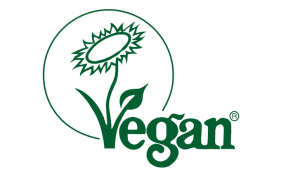
Ensures that products or services comply with the essential principles of veganism according to international criteria.
Ensures that products or services comply with the essential principles of veganism according to international criteria.
Cosmetic products bearing the Vegan label are natural products that may contain plants and minerals but are free of ingredients of animal origin (no milk, eggs, wax, lanolin, animal collagen, animal fat, etc.). Of course, vegan cosmetics are not tested on animals, nor are their ingredients.
This trademark registered by The Vegan Society is the international standard for vegan products.
This label thus serves as a distinctive sign for vegetarians and vegans (beehive products and dairy products are excluded) who do not want any animal origin in the cosmetics they consume, echoing their commitment to respect for animal life and well-being.
Cosmetic products bearing the Vegan label are natural products that may contain plants and minerals but are free of ingredients of animal origin (no milk, eggs, wax, lanolin, animal collagen, animal fat, etc.). Of course, vegan cosmetics are not tested on animals, nor are their ingredients.
This trademark registered by The Vegan Society is the international standard for vegan products.
This label thus serves as a distinctive sign for vegetarians and vegans (beehive products and dairy products are excluded) who do not want any animal origin in the cosmetics they consume, echoing their commitment to respect for animal life and well-being.
Slow Cosmétique
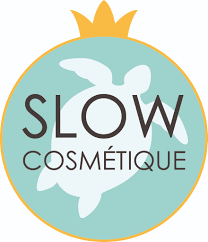
An additional means of guiding consumers towards products and services that are part of a global approach committed to more reasonable beauty. Ecological, healthy, reasonable and intelligent cosmetics.
Slow Cosmetics designates both a registered trademark as well as an association and a distance selling platform for cosmetic products; the association's objective would be to raise awareness of more ecological and responsible consumption of cosmetic products, with a view to alternative consumption (more respectful of the environment) and to promote the member brands.
The Association :
- raises consumer awareness of the presence of controversial ingredients in cosmetics;
- offers natural and simple alternatives to avoid cosmetics that contain disappointing ingredients;
- denounces the marketing abuses of certain brands, and greenwashing;
- annually congratulates brands with eco-friendly formulas and reasonable marketing by awarding them the famous Slow Cosmetics Mention.
https://www.slow-cosmetique.com
The Association :
- raises consumer awareness of the presence of controversial ingredients in cosmetics;
- offers natural and simple alternatives to avoid cosmetics that contain disappointing ingredients;
- denounces the marketing abuses of certain brands, and greenwashing;
- annually congratulates brands with eco-friendly formulas and reasonable marketing by awarding them the famous Slow Cosmetics Mention.
https://www.slow-cosmetique.com
Ecocert Matières Premières Cosmétique
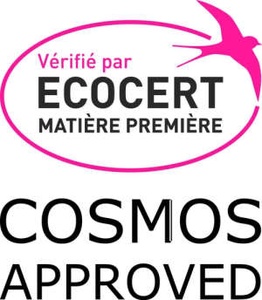
EcoCert certification on raw materials for cosmetic products.
The validation of Raw Materials is an essential step in the certification process of natural and organic cosmetics, according to the ECOCERT or COSMOS standards.
1. Manufacturers of cosmetic products can propose to ECOCERT the commercial references they wish to use in their formulations but can also search in the ECOCERT Raw Materials database for ingredients that have already been verified.
2. Raw Material suppliers can, via this verification service, benefit from a certificate and an online publication that makes it easier to promote the compliance of their ingredients with the ECOCERT or COSMOS standards.
http://www.ecocert.com/validation-matieres-premieres/index.html
1. Manufacturers of cosmetic products can propose to ECOCERT the commercial references they wish to use in their formulations but can also search in the ECOCERT Raw Materials database for ingredients that have already been verified.
2. Raw Material suppliers can, via this verification service, benefit from a certificate and an online publication that makes it easier to promote the compliance of their ingredients with the ECOCERT or COSMOS standards.
http://www.ecocert.com/validation-matieres-premieres/index.html
EcoCert Matières Premières Détergents
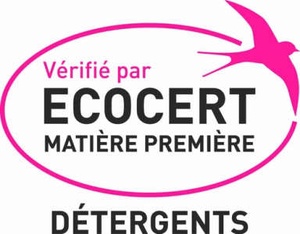
EcoCert certification on raw materials for detergents.
The validation of Raw Materials is an essential step in the certification process of natural and organic cosmetics, according to the ECOCERT or COSMOS standards.
1. Manufacturers of cosmetic products can propose to ECOCERT the commercial references they wish to use in their formulations but can also search in the ECOCERT Raw Materials database for ingredients that have already been verified.
2. Raw Material suppliers can, via this verification service, benefit from a certificate and an online publication that makes it easier to promote the compliance of their ingredients with the ECOCERT or COSMOS standards.
http://www.ecocert.com/validation-matieres-premieres/index.html
1. Manufacturers of cosmetic products can propose to ECOCERT the commercial references they wish to use in their formulations but can also search in the ECOCERT Raw Materials database for ingredients that have already been verified.
2. Raw Material suppliers can, via this verification service, benefit from a certificate and an online publication that makes it easier to promote the compliance of their ingredients with the ECOCERT or COSMOS standards.
http://www.ecocert.com/validation-matieres-premieres/index.html
Lloyd's Register LRQA

Confirms a quality management system:
- sustainable development strategies;
- verification of climate change claims.
- sustainable development strategies;
- verification of climate change claims.
Verification certifies that the data and information provided are reliable and supported by effective management systems. By reviewing the information, they are able to confirm the company's ability to meet an agreed set of criteria and, where appropriate, to provide a verification statement.
At LRQA, they aim to help their clients ensure that their sustainability strategies and climate change statements are trustworthy. This ensures that they are able to be properly rewarded by financial markets, regulators and clients for sustainability improvements.
In terms of climate change systems, they can guarantee the data and documentation relating to the design of the project to reduce or eliminate greenhouse gas (GHG) emissions. Their opinion confirms that the projects are able to meet the agreed criteria for greenhouse gas elimination or reduction.
http://www.lrqa.be
At LRQA, they aim to help their clients ensure that their sustainability strategies and climate change statements are trustworthy. This ensures that they are able to be properly rewarded by financial markets, regulators and clients for sustainability improvements.
In terms of climate change systems, they can guarantee the data and documentation relating to the design of the project to reduce or eliminate greenhouse gas (GHG) emissions. Their opinion confirms that the projects are able to meet the agreed criteria for greenhouse gas elimination or reduction.
http://www.lrqa.be
Nature et Progrès

The N&P charter requires, among other things, with regard to the ingredients:
- to use 100% organically grown plants, if possible, local plants
- to use only minerals whose extraction does not cause pollution
- not to use palm oil or its derivatives, raw materials of animal origin, synthetic ingredients, GMOs or preservatives
- Processing, packaging, room maintenance and energy use must be as eco-friendly as possible.
- to use 100% organically grown plants, if possible, local plants
- to use only minerals whose extraction does not cause pollution
- not to use palm oil or its derivatives, raw materials of animal origin, synthetic ingredients, GMOs or preservatives
- Processing, packaging, room maintenance and energy use must be as eco-friendly as possible.
Nature et Progrès is a label for organic products. The label can be found on food products, cosmetics and detergents. It indicates that production is carried out in an eco-friendly way. It is supplemented by additional requirements on biodiversity, seasonality, etc.
The label is enshrined in European legislation and is administered by Nature et Progrès. Verification is partly carried out by independent control bodies and partly by Nature et Progrès. Nature et Progrès is a federation where farmers and consumers work together to promote organic farming.
The label indicates that the products meet the requirements of organic farming.
The Nature et Progrès charter also sets out a stricter set of rules on the use of biodiversity, seasonality, animal welfare, short chain and resource use.
A number of harmful substances are prohibited during production. Products must be biodegradable.
The Nature et Progrès charter imposes a number of criteria in terms of transparency, solidarity, dissemination of knowledge and ethical financing of the company.
Verification of the criteria for organic farming is carried out by independent accredited inspection bodies appointed by the national authorities.
Control of the Nature et Progrès charter is carried out by volunteers (farmers and consumers) who prepare the audit report. This report is then examined by an inspection committee which finally grants the label.
http://www.natpro.be/
The label is enshrined in European legislation and is administered by Nature et Progrès. Verification is partly carried out by independent control bodies and partly by Nature et Progrès. Nature et Progrès is a federation where farmers and consumers work together to promote organic farming.
The label indicates that the products meet the requirements of organic farming.
The Nature et Progrès charter also sets out a stricter set of rules on the use of biodiversity, seasonality, animal welfare, short chain and resource use.
A number of harmful substances are prohibited during production. Products must be biodegradable.
The Nature et Progrès charter imposes a number of criteria in terms of transparency, solidarity, dissemination of knowledge and ethical financing of the company.
Verification of the criteria for organic farming is carried out by independent accredited inspection bodies appointed by the national authorities.
Control of the Nature et Progrès charter is carried out by volunteers (farmers and consumers) who prepare the audit report. This report is then examined by an inspection committee which finally grants the label.
http://www.natpro.be/
EcoCert Ecodetergent

Valorisation of all ingredients of natural origin.
Maximum 5% of synthetic ingredients from the restrictive list in Annex I.A.1.
No minimum organic content required.
No environmental risk statements are allowed on the product.
Maximum 5% of synthetic ingredients from the restrictive list in Annex I.A.1.
No minimum organic content required.
No environmental risk statements are allowed on the product.
Launched in 2006, EcoCert's detergency standard was developed in consultation with experts in the sector, suppliers, manufacturers and distributors. The objective is to define a level of requirements that is higher than the regulations in force concerning the use of natural substances and respect for the environment throughout the production chain.
ECOCERT currently certifies more than 2100 detergents from 185 companies in 27 countries.
1. The fundamental principles of the standard
- PROTECT our planet and its resources
- INFORM the consumer
- REDUCE unnecessary discharges and waste
2. Two levels of certification to enhance the value of the manufacturer's or brand holder's approach.
For the Ecodetergents label
- Valorisation of all ingredients of natural origin
- Maximum 5% of synthetic ingredients from the restrictive list in Annex I.A.1.
- No minimum organic content required
- No environmental risk statements are allowed on the product.
3. Informing the consumer
Manufacturers and distributors of certified products have an obligation of transparency with regard to the regulations: exact percentage of ingredients of natural origin and ingredients from organic farming, the latter having to be clearly identified, an exhaustive list of the categories of ingredients contained in the products, precautions of use for the respect of the environment.
4. 4. Annual or half-yearly audits of the manufacturing and packaging sites of the products.
Thanks to the controls carried out by our auditors on the manufacturing and packaging sites, ECOCERT ensures that all the criteria of the standard are respected.
Production methods are as important as the content of the product. ECOCERT requires, through its reference system, a high-performance quality system, enabling the product to be followed throughout the production chain right back to the origin of its ingredients.
The company whose products are certified must have set up an environmental management system to reduce water and energy consumption and to improve the management of waste and discharges.
http://www.ecocert.com/ecodetergents/index.html
ECOCERT currently certifies more than 2100 detergents from 185 companies in 27 countries.
1. The fundamental principles of the standard
- PROTECT our planet and its resources
- INFORM the consumer
- REDUCE unnecessary discharges and waste
2. Two levels of certification to enhance the value of the manufacturer's or brand holder's approach.
For the Ecodetergents label
- Valorisation of all ingredients of natural origin
- Maximum 5% of synthetic ingredients from the restrictive list in Annex I.A.1.
- No minimum organic content required
- No environmental risk statements are allowed on the product.
3. Informing the consumer
Manufacturers and distributors of certified products have an obligation of transparency with regard to the regulations: exact percentage of ingredients of natural origin and ingredients from organic farming, the latter having to be clearly identified, an exhaustive list of the categories of ingredients contained in the products, precautions of use for the respect of the environment.
4. 4. Annual or half-yearly audits of the manufacturing and packaging sites of the products.
Thanks to the controls carried out by our auditors on the manufacturing and packaging sites, ECOCERT ensures that all the criteria of the standard are respected.
Production methods are as important as the content of the product. ECOCERT requires, through its reference system, a high-performance quality system, enabling the product to be followed throughout the production chain right back to the origin of its ingredients.
The company whose products are certified must have set up an environmental management system to reduce water and energy consumption and to improve the management of waste and discharges.
http://www.ecocert.com/ecodetergents/index.html
Nature et Progrès Cosmétique Bio-écologique

BIO (organic)
Minimum 95% natural ingredients or ingredients of natural origin
Minimum 10% ingredients from organic farming
Minimum 95% certifiable ingredients from organic farming
Maximum 5% synthetic ingredients
ECO (ecological)
Minimum 95% natural ingredients or ingredients of natural origin
Minimum 5% of the total ingredients from organic farming
Minimum 50% certifiable ingredients from organic farming
Maximum 5% synthetic ingredients
Minimum 95% natural ingredients or ingredients of natural origin
Minimum 10% ingredients from organic farming
Minimum 95% certifiable ingredients from organic farming
Maximum 5% synthetic ingredients
ECO (ecological)
Minimum 95% natural ingredients or ingredients of natural origin
Minimum 5% of the total ingredients from organic farming
Minimum 50% certifiable ingredients from organic farming
Maximum 5% synthetic ingredients
This is what the 2 Cosmébio logos mean: Bio (organic) and ECO (ecological)
Bio LOGO
Minimum 95% natural ingredients or ingredients of natural origin
ingredients from organic farming: Minimum 10% of total ingredients
ingredients from organic farming: Minimum 95% of certifiable ingredients
Maximum 5% synthetic ingredients
ECO LOGO
Minimum 95% natural ingredients or ingredients of natural origin
ingredients from organic farming: Minimum 5% of total ingredients
ingredients from organic farming: Minimum 50% of certifiable ingredients
Maximum 5% synthetic ingredients
The Charter guarantees respect for the following precautionary principles:
FOR PEOPLE:
- the respect and well-being of consumers: the right to exhaustive information,
- the need for transparency in both ingredients and finished products.
RESPECT FOR THE ENVIRONMENT AT ALL LEVELS:
- ways of obtaining raw materials,
- transformation processes,
- cleaning processes,
- packaging processes,
- biodegradability of the finished products,
- Recycling of packaging and all the waste resulting from its manufacture...
FOR THE ECONOMY AND SOCIETY :
Commitment to sustainable development and fair trade objectives.
Bio LOGO
Minimum 95% natural ingredients or ingredients of natural origin
ingredients from organic farming: Minimum 10% of total ingredients
ingredients from organic farming: Minimum 95% of certifiable ingredients
Maximum 5% synthetic ingredients
ECO LOGO
Minimum 95% natural ingredients or ingredients of natural origin
ingredients from organic farming: Minimum 5% of total ingredients
ingredients from organic farming: Minimum 50% of certifiable ingredients
Maximum 5% synthetic ingredients
The Charter guarantees respect for the following precautionary principles:
FOR PEOPLE:
- the respect and well-being of consumers: the right to exhaustive information,
- the need for transparency in both ingredients and finished products.
RESPECT FOR THE ENVIRONMENT AT ALL LEVELS:
- ways of obtaining raw materials,
- transformation processes,
- cleaning processes,
- packaging processes,
- biodegradability of the finished products,
- Recycling of packaging and all the waste resulting from its manufacture...
FOR THE ECONOMY AND SOCIETY :
Commitment to sustainable development and fair trade objectives.
Sans conservateur

Preservative-free product
FAIRTRADE
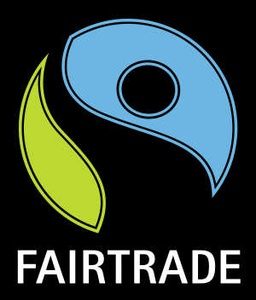
Fairtrade standards are designed to fight poverty and empower producers in the world's poorest countries. The standards apply to both producers and traders.
ECOGARANTIE

The ECOGARANTIE label guarantees that the ingredients of the product have a qualitative origin, are renewable if possible and not harmful, and that the plant extracts are 100% organic. The production process respects humans, animals and nature.
The Ecogarantie label evaluates products and producers according to 3 criteria:
- the labelled products cannot contain any GMOs, which will be the case as long as the safety of people cannot be guaranteed;
- prohibition of the use of petrochemical products in labelled products;
- All ingredients must be biodegradable and all components of plant origin must be 100% organic.
The organisation:
Ecogarantie is a non-profit organisation. It is not a private but independent label, guaranteeing that the products and their ingredients comply with strict quality standards in terms of safety, ecology and ethics.
Ecogarantie is not linked to any commercial organisation.
Compliance with Ecogarantie's standards is monitored by independent third party audit bodies, which check the conformity of raw materials and finished products throughout the production process.
Labelled brands demonstrate a high level of respect for human rights and have a policy of equal rights and treatment for all, all employees without discrimination on the basis of age, gender, race, philosophical beliefs or sexual orientations. In addition, they must respect their consumers and suppliers with quality products at fair prices.
- the labelled products cannot contain any GMOs, which will be the case as long as the safety of people cannot be guaranteed;
- prohibition of the use of petrochemical products in labelled products;
- All ingredients must be biodegradable and all components of plant origin must be 100% organic.
The organisation:
Ecogarantie is a non-profit organisation. It is not a private but independent label, guaranteeing that the products and their ingredients comply with strict quality standards in terms of safety, ecology and ethics.
Ecogarantie is not linked to any commercial organisation.
Compliance with Ecogarantie's standards is monitored by independent third party audit bodies, which check the conformity of raw materials and finished products throughout the production process.
Labelled brands demonstrate a high level of respect for human rights and have a policy of equal rights and treatment for all, all employees without discrimination on the basis of age, gender, race, philosophical beliefs or sexual orientations. In addition, they must respect their consumers and suppliers with quality products at fair prices.
FSC Recycled

Guarantees that the wood or all wood fibre components of the product are 100% recycled material.
Environment FSC is a multi-criteria label with numerous environmental requirements for responsible and sustainable forest management. The common denominator of FSC-certified forest management is the maintenance of the forest ecosystem and all associated forest functions. This does not only mean preserving biodiversity, but also protecting forest water resources, combating damage and pollution or, for example, protecting the soil from deterioration.
Paper and wood products bearing the FSC Recycled label are produced from 100% recycled fibres or wood. At present, the FSC label does not contain any further requirements regarding the processing of FSC wood into finished products, but is therefore limited to the responsible source. For example, there are no requirements for the paper production process. Those who wish to be careful or want more guarantees must therefore combine the FSC label with a label that actually gives guarantees in terms of clean production.
Social FSC is not a social label "per se", but has incorporated many social requirements, both in terms of forest management and further processing. FSC-certified forests must be managed in a socially correct manner and must therefore meet a wide range of social requirements. These relate in particular to safe and fair working conditions for forest workers. The rights of the local population - even if they are not laid down by law - must also be respected and forest management must benefit local society. The processing of FSC wood or other forest products must also meet certain social requirements, particularly with regard to the ILO's core conventions on occupational safety. The FSC label also focuses on working conditions during production.
Paper and wood products bearing the FSC Recycled label are produced from 100% recycled fibres or wood. At present, the FSC label does not contain any further requirements regarding the processing of FSC wood into finished products, but is therefore limited to the responsible source. For example, there are no requirements for the paper production process. Those who wish to be careful or want more guarantees must therefore combine the FSC label with a label that actually gives guarantees in terms of clean production.
Social FSC is not a social label "per se", but has incorporated many social requirements, both in terms of forest management and further processing. FSC-certified forests must be managed in a socially correct manner and must therefore meet a wide range of social requirements. These relate in particular to safe and fair working conditions for forest workers. The rights of the local population - even if they are not laid down by law - must also be respected and forest management must benefit local society. The processing of FSC wood or other forest products must also meet certain social requirements, particularly with regard to the ILO's core conventions on occupational safety. The FSC label also focuses on working conditions during production.
FSC Mix

Guarantees that all wood or wood fibre components of the product result from a manufacturing process where FSC materials have been mixed with recycled and/or controlled materials. Each product bearing the FSC Mixed label indicates the use of at least 70% FSC inputs.
Environment FSC is a multi-criteria label with numerous environmental requirements for responsible and sustainable forest management. The common denominator of FSC-certified forest management is the maintenance of the forest ecosystem and all associated forest functions. This does not only mean preserving biodiversity, but also protecting forest water resources, combating damage and pollution or, for example, protecting the soil from deterioration.
Paper and wood products bearing the "FSC mix" label are made from at least 70% fibre or wood from sustainably managed forests (FSC certified forests) and/or recycled materials. The remaining 30% must also meet the minimum source requirements with, for example, the prohibition of illegal logging, deforestation or genetically modified trees.
Social FSC is not a social label "per se", but has incorporated many social requirements, both in terms of forest management and further processing. FSC-certified forests must be managed in a socially correct manner and must therefore meet a wide range of social requirements. These relate in particular to safe and fair working conditions for forest workers. The rights of the local population - even if they are not laid down by law - must also be respected and forest management must benefit local society. The processing of FSC wood or other forest products must also meet certain social requirements, particularly with regard to the ILO's core conventions on occupational safety. The FSC label also focuses on working conditions during production.
Paper and wood products bearing the "FSC mix" label are made from at least 70% fibre or wood from sustainably managed forests (FSC certified forests) and/or recycled materials. The remaining 30% must also meet the minimum source requirements with, for example, the prohibition of illegal logging, deforestation or genetically modified trees.
Social FSC is not a social label "per se", but has incorporated many social requirements, both in terms of forest management and further processing. FSC-certified forests must be managed in a socially correct manner and must therefore meet a wide range of social requirements. These relate in particular to safe and fair working conditions for forest workers. The rights of the local population - even if they are not laid down by law - must also be respected and forest management must benefit local society. The processing of FSC wood or other forest products must also meet certain social requirements, particularly with regard to the ILO's core conventions on occupational safety. The FSC label also focuses on working conditions during production.
FSC 100%

Guarantees that all wood or wood fibre components of the product come from FSC-certified forests.
Environment FSC is a multi-criteria label with numerous environmental requirements for responsible and sustainable forest management. The common denominator of FSC-certified forest management is the maintenance of the forest ecosystem and all associated forest functions. This does not only mean preserving biodiversity, but also protecting forest water resources, combating damage and pollution or, for example, protecting the soil from deterioration.
Paper and wood products bearing the FSC 100% label are made from 100% fibre from responsibly managed forests.
Social FSC is not a social label "per se", but has incorporated many social requirements, both in terms of forest management and further processing. FSC-certified forests must be managed in a socially correct manner and must therefore meet a wide range of social requirements. These relate in particular to safe and fair working conditions for forest workers. The rights of the local population - even if they are not laid down by law - must also be respected and forest management must benefit local society. The processing of FSC wood or other forest products must also meet certain social requirements, particularly with regard to the ILO's core conventions on occupational safety. The FSC label also focuses on working conditions during production.
Paper and wood products bearing the FSC 100% label are made from 100% fibre from responsibly managed forests.
Social FSC is not a social label "per se", but has incorporated many social requirements, both in terms of forest management and further processing. FSC-certified forests must be managed in a socially correct manner and must therefore meet a wide range of social requirements. These relate in particular to safe and fair working conditions for forest workers. The rights of the local population - even if they are not laid down by law - must also be respected and forest management must benefit local society. The processing of FSC wood or other forest products must also meet certain social requirements, particularly with regard to the ILO's core conventions on occupational safety. The FSC label also focuses on working conditions during production.
LABEL ROUGE

Concerns foodstuffs or non-food and unprocessed agricultural products.
At all stages of production and elaboration, the product meets rigorous controls and requirements for superior quality and taste.
At all stages of production and elaboration, the product meets rigorous controls and requirements for superior quality and taste.
The Label Rouge is a French sign of quality (redefined in the agricultural orientation law of 5 January 2007).
This certification attests that a foodstuff or a non-food and unprocessed agricultural product has a set of previously fixed characteristics that establish a superior level of quality.
At all stages of production and elaboration, the product must meet rigorous controls and requirements in terms of quality and taste. In particular, the product must be distinguished by its production or manufacturing conditions. The difference in quality compared to similar everyday products must be directly perceptible to the final consumer, both in terms of taste and the image it conveys.
The products eligible for a red label are foodstuffs (including seafood) and non-food and unprocessed agricultural products (e.g. flowers).
OBJECTIVES
The Label Rouge is the only official sign that attests to a superior level of quality. This approach makes it possible to conquer new markets by differentiating from standard products.
Technical added value: the specifications provide a guide to optimise the organisation and production techniques;
An economic added value: an image of consumer confidence in a quality product.
GENERAL CHARACTERISTICS
Operators' compliance with the specifications is monitored by certification bodies accredited by COFRAC and approved by INAO, with regard to their independence, impartiality, competence and the effectiveness of their controls. Bureau Veritas Certification France is one of these bodies.
At all stages of production and development, the product must meet requirements that may be specified in technical instructions, which are updated periodically.
Organoleptic tests are carried out regularly to demonstrate the gustative quality of the Label Rouge product. This quality must always be superior to that of common products of the same nature.
A food or product can simultaneously benefit from a Label Rouge and a protected geographical indication (IGP) or a guaranteed traditional speciality.
TARGETS
- farmers,
- poultry sector (poultry-lambs),
- dairy products sector,
- delicatessen sector,
- seafood sector,
- meat sector (cattle, calves, pigs, lambs),
- fruit and vegetable sector,
- other fresh and processed products sector.
This certification attests that a foodstuff or a non-food and unprocessed agricultural product has a set of previously fixed characteristics that establish a superior level of quality.
At all stages of production and elaboration, the product must meet rigorous controls and requirements in terms of quality and taste. In particular, the product must be distinguished by its production or manufacturing conditions. The difference in quality compared to similar everyday products must be directly perceptible to the final consumer, both in terms of taste and the image it conveys.
The products eligible for a red label are foodstuffs (including seafood) and non-food and unprocessed agricultural products (e.g. flowers).
OBJECTIVES
The Label Rouge is the only official sign that attests to a superior level of quality. This approach makes it possible to conquer new markets by differentiating from standard products.
Technical added value: the specifications provide a guide to optimise the organisation and production techniques;
An economic added value: an image of consumer confidence in a quality product.
GENERAL CHARACTERISTICS
Operators' compliance with the specifications is monitored by certification bodies accredited by COFRAC and approved by INAO, with regard to their independence, impartiality, competence and the effectiveness of their controls. Bureau Veritas Certification France is one of these bodies.
At all stages of production and development, the product must meet requirements that may be specified in technical instructions, which are updated periodically.
Organoleptic tests are carried out regularly to demonstrate the gustative quality of the Label Rouge product. This quality must always be superior to that of common products of the same nature.
A food or product can simultaneously benefit from a Label Rouge and a protected geographical indication (IGP) or a guaranteed traditional speciality.
TARGETS
- farmers,
- poultry sector (poultry-lambs),
- dairy products sector,
- delicatessen sector,
- seafood sector,
- meat sector (cattle, calves, pigs, lambs),
- fruit and vegetable sector,
- other fresh and processed products sector.
VEGANOK
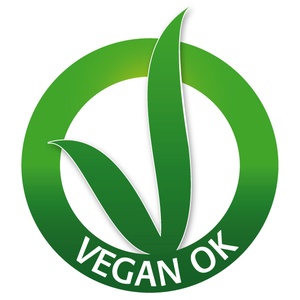
Standard for ethical vegan products, created in Italy, which guarantees the absence of elements of animal origin.
VeganOK is the first and only standard for ethical vegan products created in Italy, whose staff is entirely composed of vegan people who care about the spreading of this ethical choice.
The thorough knwoledge of every aspect of the Vegan choice and everything related to the respect for the life of all living being, characterizes their work for over a decade.
VeganOK is the most known ethical standard with over 1000 companies, services and tens of thousands of products certified in Italy and around the world.
The thorough knwoledge of every aspect of the Vegan choice and everything related to the respect for the life of all living being, characterizes their work for over a decade.
VeganOK is the most known ethical standard with over 1000 companies, services and tens of thousands of products certified in Italy and around the world.
Fair Rubber

The "FSC 100% rubber" logo guarantees that the rubber used comes exclusively from FSC-certified forests or plantations and guarantees that buyers pay a surcharge of 0.50€/kg DRC (dry rubber content) regardless of the world market price.
The "FSC 100% rubber" logo guarantees that the rubber used comes exclusively from FSC-certified forests or plantations.
The Forest Stewardship Council campaigns for a fair and responsible treatment of relations with humans and nature. Forest management must be ecologically sustainable, socially beneficial and economically efficient.
They operate according to 10 principles that apply worldwide: transparency, recognition of the rights of forest workers and local people, efficient long-term use of the forest, preservation of biodiversity and ecosystems, plantations complement the use of natural forests, no clear-cutting. These principles are transformed into national standards adapted to local conditions. Independent auditors check once a year whether these standards are being adhered to. All parts of a supply chain must be FSC-certified in order to display the logo on the final product.
The Fair Rubber logo guarantees that buyers pay an extra €0.50 per kg of DRC (dry rubber content) regardless of the world market price.
This bonus is allocated to primary rubber producers, plantation workers and small farmers to ensure as much as possible that they can cover their production costs and have a decent life even when world market prices are low.
A continuous monitoring process ensures that these criteria are respected by buyers and suppliers.
2 other guarantees:
- Renouncing intermediate trade where possible.
- Appropriate working conditions and protection of workers, recognition of the rights of the local population, etc.
The Forest Stewardship Council campaigns for a fair and responsible treatment of relations with humans and nature. Forest management must be ecologically sustainable, socially beneficial and economically efficient.
They operate according to 10 principles that apply worldwide: transparency, recognition of the rights of forest workers and local people, efficient long-term use of the forest, preservation of biodiversity and ecosystems, plantations complement the use of natural forests, no clear-cutting. These principles are transformed into national standards adapted to local conditions. Independent auditors check once a year whether these standards are being adhered to. All parts of a supply chain must be FSC-certified in order to display the logo on the final product.
The Fair Rubber logo guarantees that buyers pay an extra €0.50 per kg of DRC (dry rubber content) regardless of the world market price.
This bonus is allocated to primary rubber producers, plantation workers and small farmers to ensure as much as possible that they can cover their production costs and have a decent life even when world market prices are low.
A continuous monitoring process ensures that these criteria are respected by buyers and suppliers.
2 other guarantees:
- Renouncing intermediate trade where possible.
- Appropriate working conditions and protection of workers, recognition of the rights of the local population, etc.
PEFC

Private forest certification that promotes sustainable forest management.
Programme for the Endorsement of Forest Certification Schemes (PEFC) is a is a private forest certification system which provides assurance that forests are managed sustainably. PEFC is the first forest certification system in terms of certified forest areas and the world's leading source of certified wood.
PEFC certification is based on a process of dialogue and consensus between forest owners, wood processing companies, nature conservation associations and forest users.
PEFC certification is based on a process of dialogue and consensus between forest owners, wood processing companies, nature conservation associations and forest users.
AZO FREE
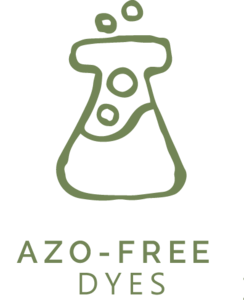
Means "free of AZO class dyes" i.e. free of azo dyes, dangerous chemical dyes and free of heavy metals.
"AZO FREE" literally means "free of AZO class dyes" (azo dyes)
Azo dyes are chemical dyes used in the dyeing industry for dyeing cellulosic fibres in all forms.
The AZO FREE label certifies that when dyeing or painting, the dyes used are free of heavy metals and dangerous chemicals.
The risks for the planet are therefore reduced and contact with the textile or material is safe.
Azo dyes are chemical dyes used in the dyeing industry for dyeing cellulosic fibres in all forms.
The AZO FREE label certifies that when dyeing or painting, the dyes used are free of heavy metals and dangerous chemicals.
The risks for the planet are therefore reduced and contact with the textile or material is safe.
SANS gluten, oeuf, fruit à coque, produit laitier, arôme, levure

Free of gluten, egg, nuts, dairy, flavour and yeast.
Biogarantie
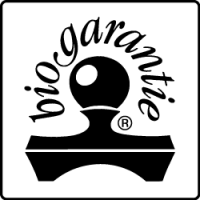
Strict Belgian standard for the production and processing of products with respect for Nature, Humans and Animals.
Organic producers have to comply with strict standards regarding their production methods. They are committed to growing their products in the most eco-friendly way possible. This means that they avoid the use of pesticides and promote the soil ecosystem as a source of plant nutrients. Livestock farmers pay particular attention to animal welfare by providing quality housing and regular access to open and grazing areas.
Members use only ingredients of controlled origin. They pay particular attention to the nature of their products and guarantee nitrite- and nitrate-free food. During processing, the biological integrity and nutritional quality of the products is always preserved. Our members are also committed to being transparent and to clearly indicating whether any of their products are in conversion to organic. Finally, food traceability is always ensured.
Members use only ingredients of controlled origin. They pay particular attention to the nature of their products and guarantee nitrite- and nitrate-free food. During processing, the biological integrity and nutritional quality of the products is always preserved. Our members are also committed to being transparent and to clearly indicating whether any of their products are in conversion to organic. Finally, food traceability is always ensured.
OK biobased

Product composed of more than 80% renewable raw materials.
Environment :
OK Biobased is an ecological label. This label indicates that the products have been manufactured with a given percentage of renewable raw materials. If the product consists of 20 to 40% renewable raw materials, it is awarded 1 star. For 40 to 60% it receives 2 stars. For 60 to 80%, it receives 3 stars. For more than 80%, it is awarded 4 stars. Products with the OK Biobased label consist of at least 30% carbon. The carbon content of the renewable raw material is at least 20%. Glass and metal products are therefore excluded.
Social:
OK Biobased is not a social label.
The control is carried out by Vinçotte, a company designated by the Belgian government.
OK Biobased is an ecological label. This label indicates that the products have been manufactured with a given percentage of renewable raw materials. If the product consists of 20 to 40% renewable raw materials, it is awarded 1 star. For 40 to 60% it receives 2 stars. For 60 to 80%, it receives 3 stars. For more than 80%, it is awarded 4 stars. Products with the OK Biobased label consist of at least 30% carbon. The carbon content of the renewable raw material is at least 20%. Glass and metal products are therefore excluded.
Social:
OK Biobased is not a social label.
The control is carried out by Vinçotte, a company designated by the Belgian government.
OK compost HOME

Guarantee that the product is biodegradable in garden compost.
Due to the relatively small volume of waste, the temperature in a garden compost bin is lower and less constant than in an industrial composting centre. Home composting is therefore a more difficult and slower process.
TÜV AUSTRIA's innovative response to this challenge is the OK compost HOME certification, which guarantees complete biodegradation under these particular conditions as for home composting.
OK compost HOME is not based on one standard but on several standards.
The OK compost HOME certification programme does not explicitly refer to a specific standard, but details all the technical requirements that a product must meet in order to obtain certification. A pioneer in this field, the requirements of the OK compost HOME programme, defined in 2003 and never questioned since then, have served as the basis for several standards such as
Australia: AS 5810 (2010) - Biodegradable plastics - Biodegradable plastics suitable for home composting
France: NF T 51800 (2015) - Plastics - Specifications for plastics suitable for domestic composting
Europe: prEN 17427 (2020) - Packaging - Requirements and test scheme for carrier bags suitable for treatment in well-managed home composting installations
TÜV AUSTRIA's innovative response to this challenge is the OK compost HOME certification, which guarantees complete biodegradation under these particular conditions as for home composting.
OK compost HOME is not based on one standard but on several standards.
The OK compost HOME certification programme does not explicitly refer to a specific standard, but details all the technical requirements that a product must meet in order to obtain certification. A pioneer in this field, the requirements of the OK compost HOME programme, defined in 2003 and never questioned since then, have served as the basis for several standards such as
Australia: AS 5810 (2010) - Biodegradable plastics - Biodegradable plastics suitable for home composting
France: NF T 51800 (2015) - Plastics - Specifications for plastics suitable for domestic composting
Europe: prEN 17427 (2020) - Packaging - Requirements and test scheme for carrier bags suitable for treatment in well-managed home composting installations
OK compost INDUSTRIAL

Guarantee that the product is biodegradable in an industrial composting centre.
Packaging and products bearing the OK compost INDUSTRIAL logo offer the guarantee that they are biodegradable in an industrial composting centre. This applies to all their components, including inks and additives.
The certification programme is based on the EN 13432:2000 standard. This means that any product bearing the OK compost INDUSTRIAL logo meets the requirements of the European packaging directive (94/62/EC).
The certification programme is based on the EN 13432:2000 standard. This means that any product bearing the OK compost INDUSTRIAL logo meets the requirements of the European packaging directive (94/62/EC).
V-LABEL.EU
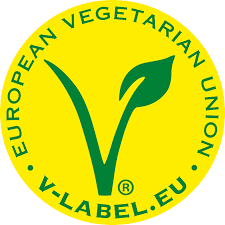
Standard for vegan and vegetarian products defined at European (but private) level, which guarantees the vegan or vegetarian character of the product (depending on the label)
The V-Label, issued by the Swiss-based company V-Label GmbH, meets standardised criteria for the labelling of vegan and vegetarian products. With the V-Label, companies outsource the responsibility for quality inspections of their vegan and vegetarian products.
The V-Label is the only independent European label for the categories "vegan" and "vegetarian".
The V-Label is the only independent European label for the categories "vegan" and "vegetarian".
Ange bleu (Der Blauer Engel)

Approach to reduce the harmful effects of the production of products on the environment, products that are considered to be as reliable, qualitative and safe as other non-environmental products.
Managed by the Federal Environment Agency (Germany), the label is granted following deliberation by the Umweltzeichen Jury, made up of 13 members (environmental and consumer protection associations, trade unions, etc.).
The label is granted to products which, while reducing the harmful effects of their production on the environment, can be considered as reliable, qualitative and safe as others. There may be products on the market that do not carry the "Blue Angel" label even if they meet the criteria, as it is only given on request.
It is only granted to products that comply with specifications that are considered particularly strict. There are no fewer than 4,000 products bearing the certification in Germany.
The Blue Angel is a member of the Global Ecolabelling Network.
It is considered to have an AA full responsibility reliability index for paper by the WWF.
The label is granted to products which, while reducing the harmful effects of their production on the environment, can be considered as reliable, qualitative and safe as others. There may be products on the market that do not carry the "Blue Angel" label even if they meet the criteria, as it is only given on request.
It is only granted to products that comply with specifications that are considered particularly strict. There are no fewer than 4,000 products bearing the certification in Germany.
The Blue Angel is a member of the Global Ecolabelling Network.
It is considered to have an AA full responsibility reliability index for paper by the WWF.
BIOPARTENAIRE
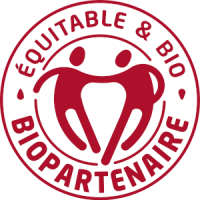
Recent certification (2002) of French origin which ensures fair treatment of organic producers
Binding specifications bringing together some thirty brand companies, primary processors and producer associations. Certification is provided by Ecocert.
Food grade quality TÜV
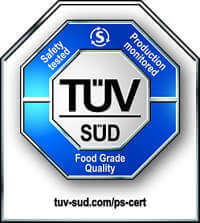
Food certification: safety, quality, ease of use
Produit belge
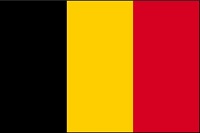
Product of Belgian origin guaranteed by KissPlanet.
KissPlanet favours local products in general, and those produced near our place of activity and distribution in particular. In a permanent concern to limit the carbon footprint of our activity and of our customers' products, we try to minimize transport and encourage local consumption.
Zero Waste
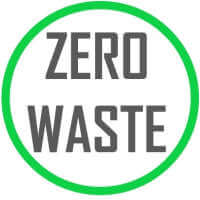
KissPlanet's selection of products with a minimal environmental footprint, considering their entire life cycle.
KissPlanet's selection of products with a minimal environmental footprint, considering their entire life cycle.
Raise Trade
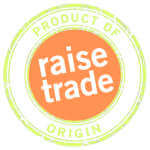
This label indicates that a significant part of the manufacturing tasks remain with the producer.
This contributes to a better distribution of profits and limits economic disparities.
This contributes to a better distribution of profits and limits economic disparities.
The label originated in the UK promotes the maintenance of high value-added activities among commodity producers, often located in developing countries. In this way, a higher share of the value created, and therefore of the income generated, remains with the producers.
This label attempts to limit the profitability gap between rich and poor countries. In this respect, it goes even further than labels such as Fairtrade or Max Havelaar.
For example, in the case of chocolate, the application of the "Raise Trade" principle guarantees a capture of the final selling price of around 33% for the producer/manufacturer, compared to 4 to 8% for the producer alone. This is 4 to 7 times more.
This label attempts to limit the profitability gap between rich and poor countries. In this respect, it goes even further than labels such as Fairtrade or Max Havelaar.
For example, in the case of chocolate, the application of the "Raise Trade" principle guarantees a capture of the final selling price of around 33% for the producer/manufacturer, compared to 4 to 8% for the producer alone. This is 4 to 7 times more.
